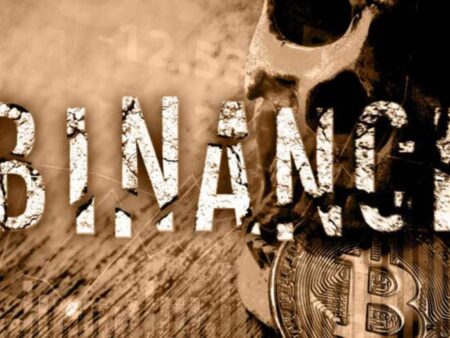Understanding the Relationship Between BlackRock and Bitcoin

BlackRock, the world’s largest asset management company, has garnered significant attention for its interest in cryptocurrency, particularly Bitcoin (BTC). Founded in 1988, the firm manages trillions of dollars in assets across various sectors, including traditional stocks, bonds, and alternative investments. BlackRock’s approach to Bitcoin has evolved, reflecting the growing institutional interest in digital assets.
In recent years, Bitcoin has transitioned from a speculative asset primarily favored by retail investors to a more mainstream investment option. This shift has been accompanied by institutional adoption, with firms like BlackRock leading the charge. As regulatory frameworks continue to develop, large players in the financial industry are increasingly recognizing Bitcoin’s potential as a hedge against inflation and economic uncertainty.
BlackRock’s involvement with Bitcoin is primarily through its investment products, including exchange-traded funds (ETFs) that aim to provide exposure to the cryptocurrency. These products are designed to attract both institutional and retail investors seeking to diversify their portfolios with digital assets. Consequently, BlackRock’s actions and decisions regarding Bitcoin can have a profound impact on market dynamics.
The firm’s massive capital reserves allow it to influence the market significantly. By investing in Bitcoin, BlackRock can provide liquidity and stability that many smaller investors may lack. Furthermore, the firm’s reputation and resources enable it to navigate complex regulatory landscapes, making it a pioneer in the institutional adoption of cryptocurrencies.
As Bitcoin gains traction in traditional finance, the relationship between BlackRock and the cryptocurrency market will continue to evolve. This evolution could lead to a more pronounced acceptance of digital assets among institutional investors, setting the stage for future growth in Bitcoin ownership.
The growing significance of Bitcoin in BlackRock’s investment strategy raises questions about their total BTC holdings relative to other major players in the cryptocurrency ecosystem, particularly exchanges like Binance.
Analyzing BlackRock’s Involvement in Cryptocurrency Markets

BlackRock’s entry into the cryptocurrency market marks a pivotal moment for the financial industry. The asset manager has been working on offering cryptocurrency-related investment products, including Bitcoin ETFs. In 2021, BlackRock initiated its first foray into Bitcoin by allowing some of its investment funds to engage in Bitcoin futures trading, signaling a strong belief in the asset’s long-term viability.
The firm’s interest in Bitcoin is not merely speculative. BlackRock has stated that cryptocurrencies like Bitcoin could serve as a hedge against inflation and currency devaluation. Given its significant assets under management, any major decision by BlackRock regarding Bitcoin can ripple through the market, influencing prices and perceptions of institutional legitimacy.
Moreover, BlackRock has been researching blockchain technology, aiming to understand its implications for financial markets. This research could pave the way for innovative investment products that integrate digital assets with traditional financial instruments. The firm’s strategic moves indicate a long-term commitment to understanding and investing in the cryptocurrency space.
BlackRock also recognizes the importance of regulation in shaping the cryptocurrency landscape. As a regulated entity, the firm is well-positioned to navigate the complex regulatory environment surrounding cryptocurrencies. This ability to adapt to regulatory changes enhances BlackRock’s credibility in the crypto space, attracting investors who may have been hesitant to enter this volatile market.
The company’s insights into risk management and market trends will likely play a crucial role in how Bitcoin and other cryptocurrencies are perceived by institutional investors. As BlackRock continues to expand its offerings related to digital assets, it will be interesting to see how this influences the broader market.
In evaluating BlackRock’s activities in the cryptocurrency market, it is essential to compare its BTC holdings with those of significant players in this space, such as cryptocurrency exchanges like Binance.
Binance: The Leading Cryptocurrency Exchange Explained

Binance has emerged as one of the largest and most influential cryptocurrency exchanges globally since its launch in 2017. With a vast array of services, including trading, staking, and lending, Binance has established itself as a comprehensive platform for both retail and institutional investors. Its user-friendly interface and diverse offerings have contributed to its rapid growth and widespread adoption.
One of Binance’s key features is its extensive selection of cryptocurrencies available for trading. Users can trade thousands of digital assets, making it an attractive option for investors seeking variety. This vast selection positions Binance as a go-to exchange for many traders, allowing them to capitalize on emerging trends in the cryptocurrency market.
Moreover, Binance has continually adapted its platform in response to market demands. The exchange has introduced several innovative features, including Binance Smart Chain, which enables developers to create decentralized applications and tokens. This adaptability has solidified Binance’s status as a market leader by creating a robust ecosystem that attracts developers and users alike.
Binance is also known for its commitment to security and regulatory compliance. The exchange has implemented advanced security measures to protect user funds and personal information. Additionally, Binance has made efforts to engage with regulators in various jurisdictions to ensure its operations are compliant with local laws.
Despite its success, Binance has faced scrutiny from regulators in multiple countries. Concerns over compliance and anti-money laundering measures have led to investigations and temporary bans in some regions. However, the exchange has responded by enhancing its compliance measures, including the introduction of Know Your Customer (KYC) protocols.
As a major player in the cryptocurrency landscape, Binance’s holdings of Bitcoin are significant. Understanding how Binance’s BTC reserves compare to BlackRock’s investments can provide deeper insights into the cryptocurrency market’s dynamics and the implications for future ownership trends.
Comparing BTC Holdings: BlackRock vs. Binance

When comparing the Bitcoin holdings of BlackRock and Binance, it is essential to consider their different roles within the cryptocurrency ecosystem. BlackRock, as an asset management firm, holds Bitcoin primarily through investment products and funds, while Binance, as a cryptocurrency exchange, holds Bitcoin for liquidity purposes and to facilitate trading for its users.
Comparison Table: BTC Holdings
| Entity | Type of Holdings | Estimated BTC Holdings | Purpose of Holdings |
|---|---|---|---|
| BlackRock | Institutional Funds | ~ 5000 BTC (via ETFs)* | Investment, asset allocation |
| Binance | Exchange Liquidity | ~ 200,000 BTC** | Trading, customer services |
*Estimated value as of October 2023 based on available data.
**Estimated value based on Binance’s liquidity and trading operations.
The difference in the scale of ownership between BlackRock and Binance is noteworthy. BlackRock’s holdings of Bitcoin are relatively modest compared to Binance’s significant reserves. This disparity reflects their distinct functions in the market; BlackRock focuses on investment strategies, while Binance emphasizes liquidity and trading facilitation.
BlackRock’s investment strategy appears to align with a long-term perspective on Bitcoin’s potential as a store of value and a hedge against inflation. In contrast, Binance’s vast BTC holdings enable it to support a wide range of trading activities, providing liquidity to users and enhancing the overall trading experience.
Both entities hold substantial influence in the cryptocurrency market, but their varying approaches to Bitcoin ownership highlight the diversity within the industry. BlackRock’s institutional positioning could lead to increased legitimacy for Bitcoin among traditional investors, while Binance’s extensive trading operations contribute to the asset’s accessibility and liquidity.
As the cryptocurrency landscape continues to evolve, monitoring the Bitcoin holdings of both BlackRock and Binance will yield valuable insights into market trends and investor sentiment.
Implications of BlackRock’s BTC Holdings on the Market

BlackRock’s involvement in Bitcoin and its holdings can have profound implications for the cryptocurrency market. As a major institutional player, the firm has the potential to drive significant capital into the Bitcoin ecosystem. Increased investment could enhance liquidity, stability, and overall market confidence.
When BlackRock announces new investment products related to Bitcoin, it often generates substantial media coverage and interest from both institutional and retail investors. This attention can lead to increased demand for Bitcoin and, subsequently, upward pressure on prices. The firm’s reputation and credibility can act as a catalyst for other institutional investors to consider Bitcoin as part of their portfolios.
Moreover, BlackRock’s engagement with regulatory bodies can pave the way for clearer guidelines and acceptance of cryptocurrencies within traditional finance. As the firm advocates for sensible regulatory frameworks, it may help create an environment where Bitcoin is seen as a legitimate asset class, attracting further institutional interest.
The implications of BlackRock’s BTC holdings extend beyond price movements. Their involvement signals a shift in how institutional investors view cryptocurrencies. With a firm as reputable as BlackRock entering the space, more traditional financial institutions may feel encouraged to explore cryptocurrency investments, leading to broader adoption.
However, this increased institutional interest could also lead to heightened scrutiny from regulators, as the market matures and attracts more significant players. BlackRock’s actions may push regulatory bodies to establish more robust frameworks governing cryptocurrency investments, setting standards for transparency and compliance.
The potential for BlackRock’s involvement to reshape market perceptions highlights the importance of monitoring its activities. As the firm continues to navigate the cryptocurrency landscape, its influence on Bitcoin’s trajectory will undoubtedly be a focal point for analysts, investors, and regulators alike.
Future Trends: Who Will Lead the Bitcoin Ownership Race?

As the cryptocurrency market continues to mature, the competition for Bitcoin ownership between institutional investors like BlackRock and exchanges like Binance is likely to intensify. Several factors will play a crucial role in determining who will lead this ownership race.
First, institutional adoption is expected to grow significantly in the coming years. As more large investors recognize Bitcoin’s potential as a store of value, firms like BlackRock will likely increase their BTC holdings. This trend could further legitimize Bitcoin as an asset class and attract more institutional capital.
Second, the evolution of cryptocurrency exchanges will influence Bitcoin ownership trends. Binance, with its extensive range of services, may continue to capture a larger share of the market. If Binance can maintain its position as a leading exchange, its BTC holdings will likely grow as more users flock to its platform.
Third, regulatory developments will play a significant role in shaping the future landscape of Bitcoin ownership. Clearer regulations could facilitate greater institutional participation, leading to increased investment from firms like BlackRock. Conversely, stringent regulations may hinder the growth of cryptocurrency exchanges, affecting their ability to accumulate Bitcoin.
Lastly, technological advancements will influence the dynamics of Bitcoin ownership











Bitcoin is not just for small buyers. Big companies like BlackRock also invest.
Binance is a big exchange and has many cryptocurrencies for trade.
Comparing BlackRock and Binance can show who holds more Bitcoin.
It is interesting that BlackRock sees Bitcoin as good against inflation.
BlackRock helps Bitcoin become more popular with big investors.
Binance is good because it has security and many choices for trading.
BlackRock is big company in finance. Now, they like Bitcoin too.
BlackRock investing in Bitcoin shows that big companies believe in it.